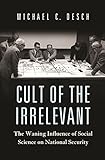Cult of the Irrelevant : The Waning Influence of Social Science on National Security / Michael C. Desch.
Material type: TextSeries: Princeton Studies in International History and Politics ; 169Publisher: Princeton, NJ : Princeton University Press, [2019]Copyright date: ©2019Description: 1 online resource (368 p.) : 8 b/w illus., 14 tablesContent type:
TextSeries: Princeton Studies in International History and Politics ; 169Publisher: Princeton, NJ : Princeton University Press, [2019]Copyright date: ©2019Description: 1 online resource (368 p.) : 8 b/w illus., 14 tablesContent type: - 9780691181219
- 9780691184906
- National security
- Social sciences and state
- POLITICAL SCIENCE / Security (National & International)
- Cold War
- Office of Strategic Services
- Second World War
- Thomas Schelling
- U.S. policymakers
- Vietnam
- Walt W. Rostow
- World War II
- academic security specialists
- academic social science
- academic strategists
- applied research
- basic research
- development strategists
- disciplinary professionalism
- economic development
- intellectual culture
- intellectual frameworks
- international relations
- international security
- national security policymakers
- national security policymaking
- national security studies
- national security
- natural sciences
- nuclear states
- nuclear strategy
- nuclear weapons
- policy decisions
- policy issues
- policy problems
- policy relevance
- policymakers
- policymaking
- political development
- political science
- political scientists
- practical relevance
- professionalization
- scientific objectivity
- scientific strategists
- social science disciplines
- social science methods
- social science
- social sciences
- social scientists
- strategic modernization theory
- 320.6 23
- H97
- online - DeGruyter
- Issued also in print.
| Item type | Current library | Call number | URL | Status | Notes | Barcode | |
|---|---|---|---|---|---|---|---|
 eBook
eBook
|
Biblioteca "Angelicum" Pont. Univ. S.Tommaso d'Aquino Nuvola online | online - DeGruyter (Browse shelf(Opens below)) | Online access | Not for loan (Accesso limitato) | Accesso per gli utenti autorizzati / Access for authorized users | (dgr)9780691184906 |
Frontmatter -- CONTENTS -- ACKNOWLEDGMENTS -- 1. The Relevance Question: Professional Social Science and the Fate of Security Studies -- 2. How War Opened the Door to the Ivory Tower during the First World War and Peace Closed It Again -- 3. World War II: Social Scientists in the Physicists' War -- 4. Social Science's Cold War: The Behavioral Revolution's Quixotic Effort to Construct a "Policy Science" -- 5. Summer Studies, Centers, and a Governmentwide Clearinghouse: Federal Efforts to Mobilize Social Science for the Cold War -- 6. The Scientific Strategists Follow the Economists to an Intellectual Dead End -- 7. Strategic Modernization Theory Bogs Down in the Vietnam Quagmire -- 8. The "Renaissance of Security" Languished until the Owl of Minerva Flew after 9/11 -- 9. Conclusions, Responses to Objections, and Scholarly Recommendations -- Notes -- Index
restricted access online access with authorization star
http://purl.org/coar/access_right/c_16ec
How professionalization and scholarly "rigor" made social scientists increasingly irrelevant to US national security policyTo mobilize America's intellectual resources to meet the security challenges of the post-9/11 world, US Secretary of Defense Robert M. Gates observed that "we must again embrace eggheads and ideas." But the gap between national security policymakers and international relations scholars has become a chasm.In Cult of the Irrelevant, Michael Desch traces the history of the relationship between the Beltway and the Ivory Tower from World War I to the present day. Recounting key "Golden Age" academic strategists such as Thomas Schelling and Walt Rostow, Desch's narrative shows that social science research became most oriented toward practical problem-solving during times of war and that scholars returned to less relevant work during peacetime. Social science disciplines like political science rewarded work that was methodologically sophisticated over scholarship that engaged with the messy realities of national security policy, and academic culture increasingly turned away from the job of solving real-world problems.In the name of scientific objectivity, academics today frequently engage only in basic research that they hope will somehow trickle down to policymakers. Drawing on the lessons of this history as well as a unique survey of current and former national security policymakers, Desch offers concrete recommendations for scholars who want to shape government work. The result is a rich intellectual history and an essential wake-up call to a field that has lost its way.
Issued also in print.
Mode of access: Internet via World Wide Web.
In English.
Description based on online resource; title from PDF title page (publisher's Web site, viewed 29. Jul 2021)


